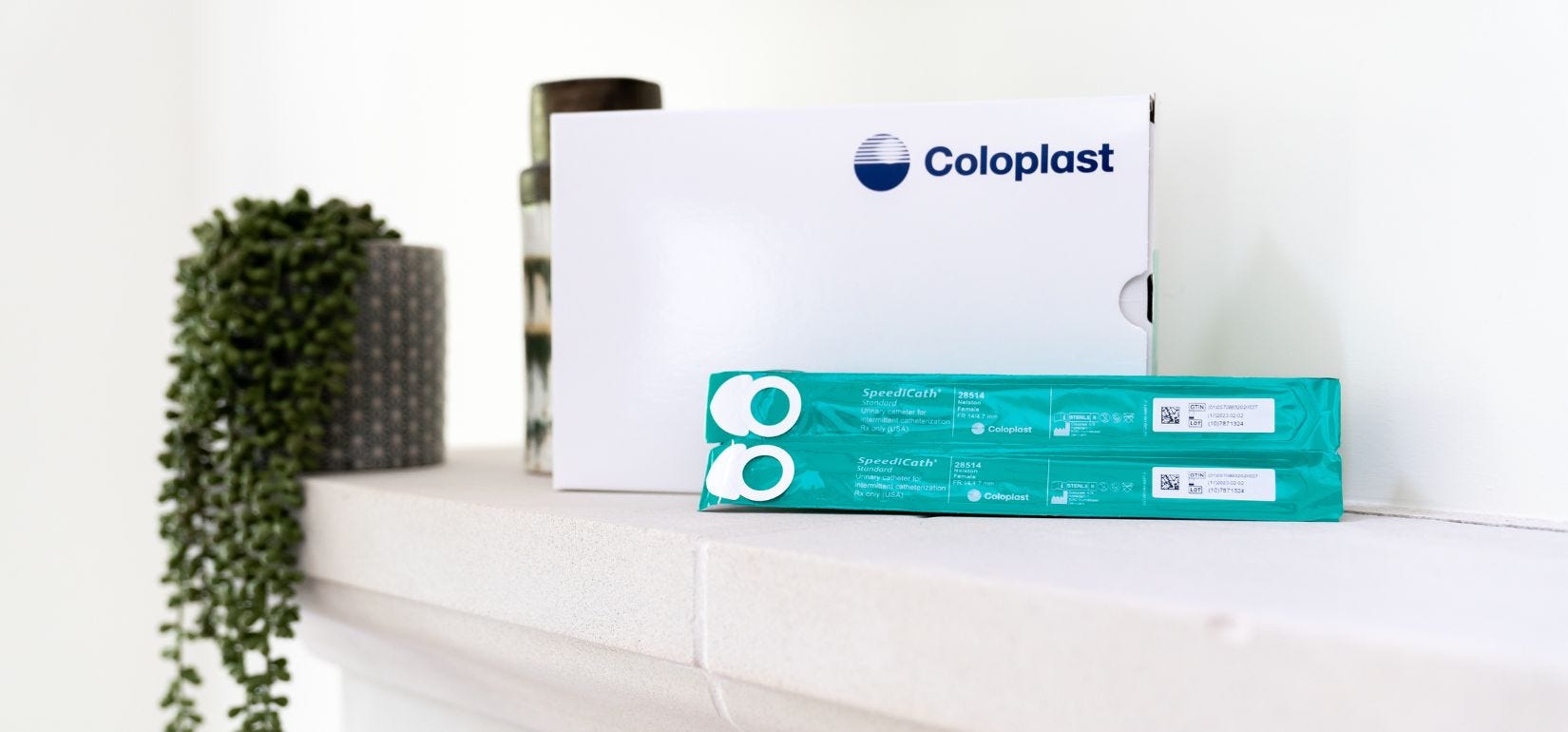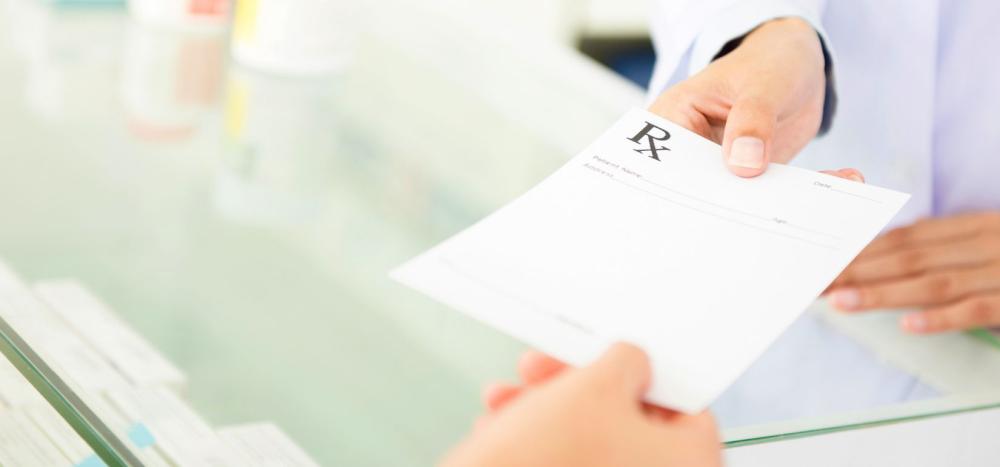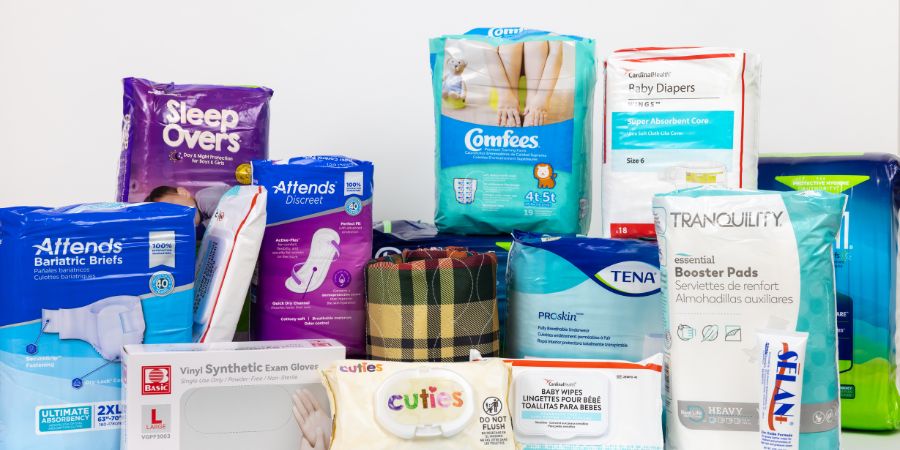Chronic kidney disease (CKD) is a form of kidney failure that progresses slowly and stealthily. Surprisingly, 9 in 10 adults don’t even know they have CKD.
One of the ways this disease can damage your body is by causing urinary incontinence or the loss of bladder control. Read this post to find out how to manage your incontinence so you can get back to focusing on what’s important to you.
The Role of Your Kidneys
It's important to first understand what your kidneys do in your body and why chronic kidney disease (CKD) may affect your bladder.
Check Your Eligibility
2 Easy Steps
Discover the continence care essentials available through your Medicaid plan.
Your 2 small kidneys work hard to keep your urinary system and body healthy in the following ways:
- Remove waste & fluids. Your kidneys filter about 50 gallons of excess fluids, waste, and harmful toxins daily. While filtering out waste and liquids, your kidneys produce about 8 cups of urine daily.
- Keep bones healthy. Your kidneys produce vitamin D, a critical vitamin for bone health.
- Manage blood pressure. Your kidneys control blood pressure levels by producing the hormone that opens and contracts blood vessels.
- Balance minerals. The kidneys determine how much water and salt are in your body. They also balance the level of minerals found in your blood, such as phosphorous, potassium, calcium, and sodium.
- Produce red blood cells. The kidneys produce the hormone erythropoietin, which helps make red blood cells. Your red blood cells are responsible for bringing oxygen to your lungs and giving your body energy.
- Balance pH levels. Acid is always present in the body; It’s produced from old cells or food you've eaten, but if you have too much acid in your system, your pH levels will be unbalanced. This is because your kidneys filter these acids out of your body.
What Is CKD?
About 15% of adults in the US have CKD, and the more you age, the higher your chances of developing CKD are. However, during the early stages of CKD, 9 in 10 adults don’t know they have it.
CKD occurs when your kidney function begins to decline, eventually leading to a total loss of kidney function. When you have CKD, your kidneys can no longer do their primary job of filtering toxins and waste products from your blood (kidney failure). According to the National Institute of Diabetes and Digestive and Kidney Diseases, the most common causes of CKD are diabetes and high blood pressure.
The damage this disease causes to the body includes:
- Incontinence
- Stroke
- Heart disease.
- Anemia
- Early death.
CKD is usually diagnosed with a blood test or urine test, and a kidney biopsy may be performed to determine whether damage has occurred in your kidneys.


While kidney damage can be controlled, it’s mostly irreversible. Some ways to control symptoms include:
Lifestyle changes: Eating a healthy diet to lower blood sugar and exercising to improve cardiovascular health can help relieve or slow down some symptoms of CKD.
Dialysis: Peritoneal dialysis can help to do what healthy kidneys usually do by removing waste and buildup from your body.
Kidney transplant: Some people with CKD may get a kidney transplant if they’re in end-stage renal disease.
Medicines: Certain medicines can help with the symptoms of CKD.
Causes
People with underlying medical conditions are at increased risk of developing CKD. Common causes of CKD and risk factors include:
- Type 1 or Type 2 diabetes.
- High blood pressure.
- Prolonged obstruction of the urinary tract is brought on by kidney stones, enlarged prostate, or cancer.
- Chronic kidney infections.
- Other underlying diseases include Vesicoureteral reflux, Interstitial nephritis,
- Glomerulonephritis, and Polycystic kidney disease.
- Family history of kidney disease.
- Acute kidney injury.
- Health problems such as obesity, high blood pressure, the use of medicines that cause kidney damage, or diabetes.
Symptoms
- Frequent urination.
- Less urination with more concentrated urine.
- Trouble sleeping.
- Weight loss or loss of appetite.
- Blood in the urine.
- Fatigue
- Shortness of breath.
- Swollen ankles, feet, or hands.
- Muscle cramps.
- Erectile dysfunction.
- Itchy skin.
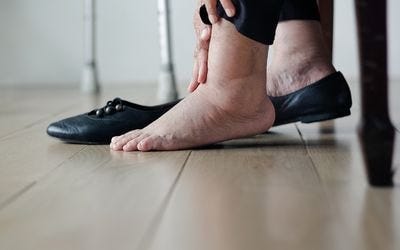

How Are CKD & Incontinence Related?
CKD causes the kidneys not to filter as well as they usually would, allowing more fluid to be transported into the urinary tract and more waste products to be left in the bloodstream. This additional volume of fluid and waste causes increased urinary frequency, which is why urinating more often than usual is one of the first symptoms of CKD in some people.
Frequent urination and the sudden and strong urge to go to the bathroom are symptoms of an overactive bladder (OAB) or urge incontinence.
While there haven’t been too many studies displaying the relationship between CKD and incontinence, one study, which surveyed 40 patients with renal failure, found that:
- 77% of patients had different degrees of abnormalities in lower urinary tract function.
- 38% had poor bladder compliance.
- 33% experienced detrusor-sphincter dyssynergia (DSD).
- 31% experienced bladder hypersensitivity.
- 25% had detrusor (bladder muscle) instability.
So, while there hasn’t been enough research on the correlation thus far, there does seem to be a link between CKD and incontinence.
How to Manage CKD & Incontinence
Use these management tips to help make taking care of your urinary incontinence easier.
1. See Your Healthcare Provider
Any changes you may notice in your urination should warrant a blood test of the kidneys, so make sure you see your healthcare provider when necessary. You should also see your provider for regular follow-up visits if you have CKD or incontinence to manage your symptoms.
2. Manage Underlying Diseases
Underlying causes of CKD, such as T2DM, hypertension, etc., can worsen your kidney disease, so be sure to treat them with the help of your healthcare provider.
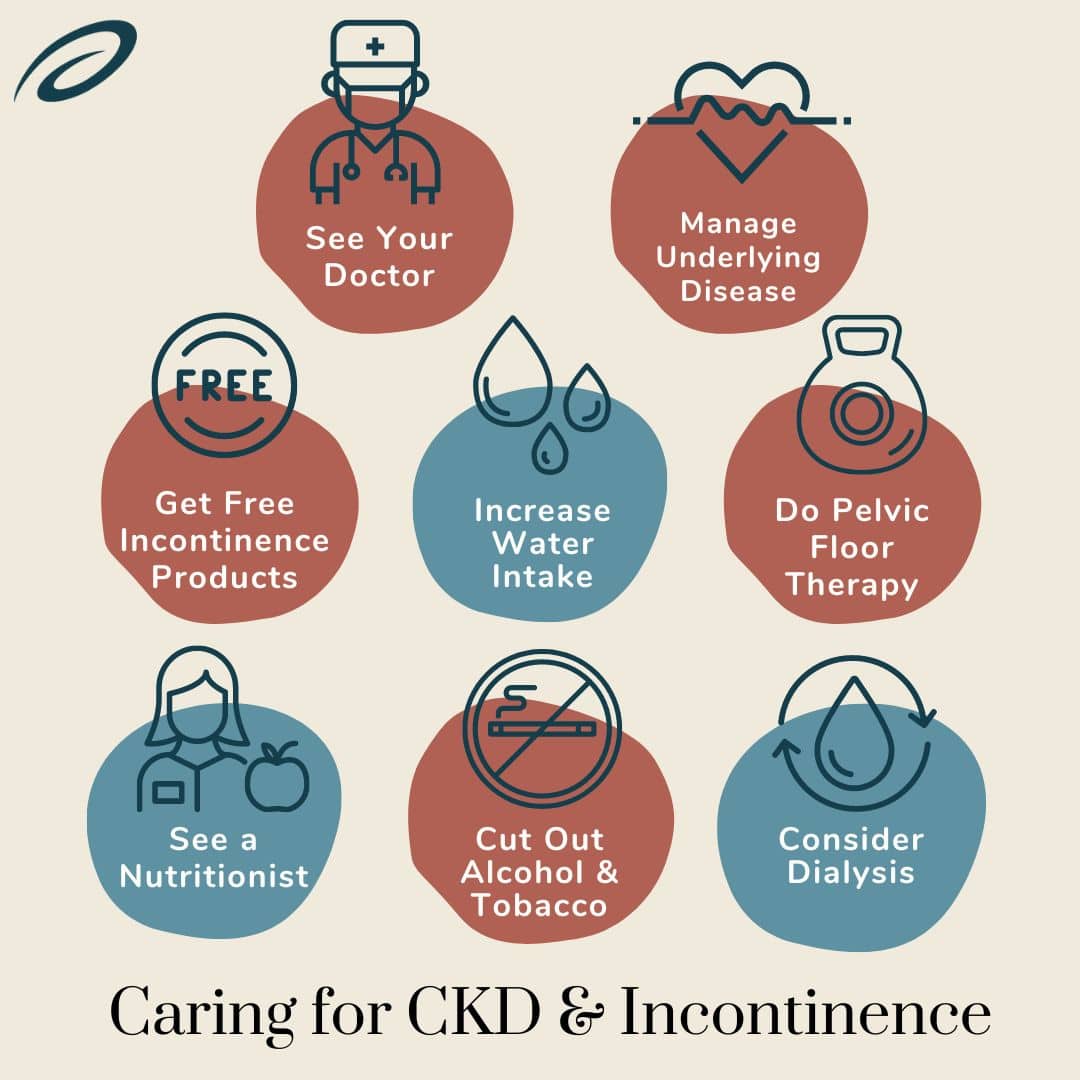

3. Get Free Incontinence Products
Aeroflow Urology is proud to help eligible patients get free incontinence supplies through their insurance. We can send you free product samples, help you fill out your paperwork, obtain a prescription from your healthcare provider, and send your products in unmarked boxes every month, so you don’t have to run to the store for supplies.
To see if you qualify today, fill out our Eligibility Form. From there, one of our Continence Care Specialists will reach out to you and let you know the next steps.
4. Increase Your Water Intake
While it may sound counterintuitive, drinking more water while you have CKD can help your kidneys filter more waste through your body and help with symptoms of CKD and incontinence.
5. Do Pelvic Floor Therapy
While these exercises won’t help your CKD, pelvic floor exercises can help strengthen those muscles and lessen incontinence symptoms over time.
6. See a Nutritionist
It’s always good to be aware of what foods will worsen your CKD or incontinence, so meet with a nutritionist to find out what those are and avoid them. Diet is one of the simplest ways to help manage CKD and urinary incontinence.
7. Cut Out Alcohol & Tobacco
Both of these things can make your CKD and incontinence worse due to irritating the bladder and harming the internal organs. Try to avoid these things if you can.
8. Consider Dialysis
If you have CKD, dialysis is key to ridding your body of waste when your kidneys can no longer perform on their own. Make appointments to discuss this process or make the appointments as frequently as your healthcare provider recommends.
Top 5 Jobs Kidneys Do. (2015, March 16). National Kidney Foundation. https://www.kidney.org/kidneydisease/top-5-jobs-kidneys-do#:~:text=Your%20kidneys%20act%20like%20a
NIDDK. (2018, June). Your Kidneys & How They Work | NIDDK. National Institute of Diabetes and Digestive and Kidney Diseases. https://www.niddk.nih.gov/health-information/kidney-disease/kidneys-how-they-work#:~:text=Your%20kidneys%20remove%20wastes%20and
CDC. (2021, March 9). Chronic Kidney Disease in the United States, 2021. Www.cdc.gov. https://www.cdc.gov/kidneydisease/publications-resources/ckd-national-facts.html
Zermann, D.-H., Löffler, U., Reichelt, O., Wunderlich, H., Wilhelm, S., & Schubert, J. (2003). International Urology and Nephrology, 35(1), 93–97. https://doi.org/10.1023/a:1025910025216
and, D. (2019, June 12). Chronic Kidney Disease (CKD) | NIDDK. National Institute of Diabetes and Digestive and Kidney Diseases.https://www.niddk.nih.gov/health-information/kidney-disease/chronic-kidney-disease-ckd
Information provided on the Aeroflow Urology blog is not intended as a substitute for medical advice or care. Aeroflow recommends consulting your healthcare provider if you are experiencing medical issues relating to incontinence.



